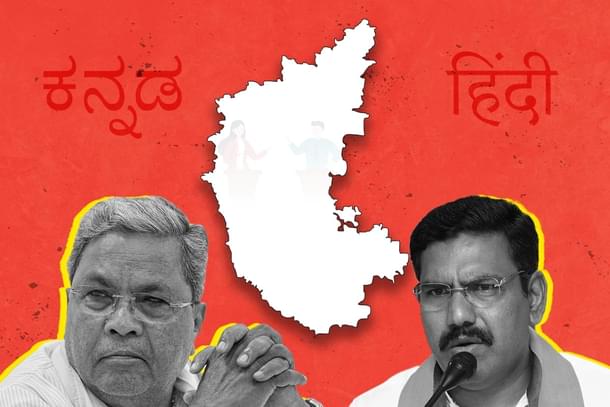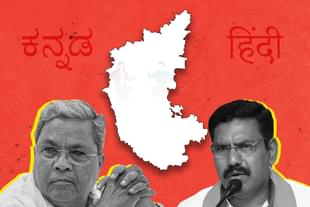Karnataka
Karnataka: As Congress Pushes 'North Versus South', 'Hindi Versus Kannada' Debates, BJP Warms The Fence
Sharan Setty
Jul 22, 2024, 02:53 PM | Updated 03:12 PM IST
Save & read from anywhere!
Bookmark stories for easy access on any device or the Swarajya app.


Since the Siddaramaiah-led Congress government came to power in Karnataka, the political discourse has drastically changed from 'double-engine sarkara' to 'Hindi versus Kannada' and the 'south tax movement'.
Earlier this year, before the general elections, Chief Minister Siddaramaiah led a delegation of Congress leaders to New Delhi to protest against the Centre's alleged discriminatory treatment against non-Hindi-speaking states like Karnataka.
According to the Congress, the Bharatiya Janata Party (BJP) government at the Centre has not been coughing up a fair share of the budget for development projects in the south, especially Karnataka, while it derives the highest tax revenues from the state.
More recently, the proposed bill to introduce language-based reservations for Kannadigas in the private sector was debated in the media and online, with India Inc bashing the move. While netizens discussed the pros and cons of this proposed legislation, many pointed out that the BJP proposed the move first, when B S Yediyurappa was the chief minister in 2020.
While the BJP has put out a statement that it stands with Kannadigas and their interests, it hasn't made much noise on the issue.
In urban centres like Bengaluru, the party derives a significant chunk of support from non-Kannada locals, especially those from northern states of India.
Congress has been attempting to make inroads once again into Bengaluru — its stronghold once upon a time. By taking up issues related to infrastructure woes and appeasing the middle-class voter, the BJP has made Bengaluru its fortress.
It has been in power at the local municipal level for more than a decade and has a majority of the MLAs from the city, including all the four Members of Parliament from Bengaluru South, Bengaluru Central, Bengaluru North and the latest one being Bengaluru Rural.
With the presence of leaders like K J George, N A Harris, and Ramalinga Reddy, the Congress already has its pockets of support from Tamil, Telugu and Malayali voters in the city in constituencies such as Shantinagar, Sarvagnanagar, BTM Layout, Jayanagar and Gandhinagar.
By targeting the urban poor with the freebie schemes, it aims to woo the voters once again against the BJP which is seen as a party that is more often than not silent on matters of local interest such as reservations for Kannadigas.
If the data is true, there are more than 22,000 registered migrant voters in the city in the three parliamentary constituencies.
Nearly four out of 10 'Bengalurigas' speak non-Kannada languages (and this is per the 2011 census). The situation would be even more drastic today, with thousands of people moving to India's silicon valley every year.
According to the same census, 38 lakh people living in the city (of the 1.2 crore residents) were non-Kannadigas. Nearly half — 42.12 per cent population that resides in Greater Bengaluru are from outside the city or the state.
BJP leaders like P C Mohan, the third-time MP from Bengaluru Central are benefitting from this. Nearly 40 per cent of the constituency's voters are migrants. It is for the same reason that BJP MP Tejasvi Surya is seen condemning attacks on Jain 'brethren' by pro-Kannada groups or standing with Hindu shopkeepers in Nagarathpete.
Politics in the garden city is not just woven by caste and language dynamics, but a strong but silent undercurrent is wrapped with communal tapestry. If the BJP attempts to woo Tamil Hindu migrant voters in Shivajinagara, the Congress tries to win over the Dakhini Urdu speaking Muslims in the area.
During the 2023 assembly elections in Karnataka, the BJP deployed nearly 50 non-Kannada leaders from across the country to campaign for the party in the state. While Hardik Patel tried to win over the Patidars living in the city, K Annamalai would hold roadshows (more recently during the LS polls) to appeal to the Tamil community in the city.
In each parliamentary constituency, a BJP leader estimated that there are about 25,000 to 30,000 migrant voters. The BJP can't ignore thousands of voters in any constituency its rivals are using every trick in the book to wrest from it. .
Karnataka has had different waves of migration since its formation in 1956. Since the state was carved out from different presidencies and kingdoms — Mysore, Hyderabad, Bombay, Madras — it has had non-Kannada regions in the state from the beginning.
To this day, the pro-Kannada movement is not just relevant to Bengaluru but also to the border regions of the state including Kolar, Belagavi, Dakshina Kannada and Chamarajanagar — districts that border different states in four different directions.
It also matters to the non-Kannada locals like Kodavas and Tulu-speakers who dominate the politics in Karavali Karnataka, a stronghold of the BJP.
Sharan Setty (Sharan K A) is an Associate Editor at Swarajya. He tweets at @sharansetty2.





